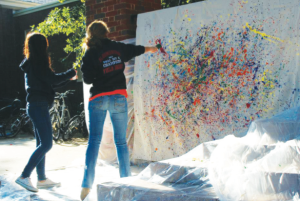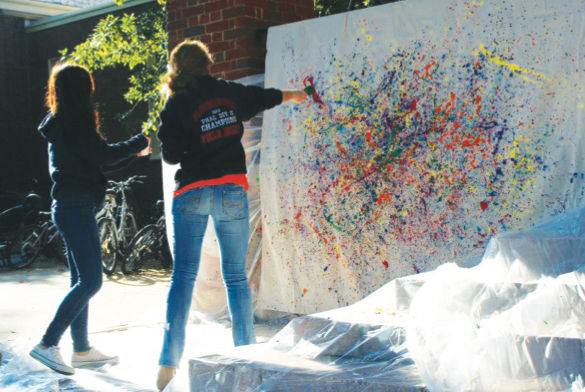
By: Rebecca Zimmerman, Copy Editor
Oct. 20, the front steps of the James P. Duke library were transformed from a place of staid outdoor academic study, to a studio of artistic expression and creation. Alpha Phi Omega, working with Phi Mu Alpha and the Furman Film Club, used the steps to host Art Therapy, a paint- splattered service event that encouraged students to release their personal and academic stress through color and creation.
APO hosted the event to bring students together and to improve the campus’ mental health.
“I first brought up the idea last fall as a unique way to relieve midterm stress. I think expressing oneself visually is an incredibly liberating feeling, and it was something I wanted to share with as many people as I could,” APO President Christie Hoff said.
This attempt to unite Furman students during the most stressful academic periods of their semesters fits with APO’s overall goals to foster brotherhood while doing serve to the nation, community, college, and fraternity, Hoff said.
The event included five unique stations that each allowed students to address a different aspect of their mental health.
At the “Splatter Paint” station, students released their anger with color and laughter, slinging red, blue, green, and yellow paint at a nine by twelve canvas suspended over the left side of the library steps. Within minutes, most students discovered that this was more fun to do in pairs than alone, dodging each others’ paint splatters as they made art side by side.
Encouraging students to open up, the “Draw Your Alter Ego” station roused students to draw the sides of themselves that they rarely showed to other people. Representing their struggles, anxieties, bad habits, and secret talents with markers and paint, students recognized hidden facets of their personalities while seeing the sparks hidden in their colleagues.
At the “Paint to Music” station, attendees found more free-form artistic experiences. Musicians from PMA switched off during the event to provide music as a vessel for emotional expression.
The “Write Your Worries” station took a clearer mental health stance, allowing students to write down, tear, and then burn their negative thoughts, symbolically conquering their struggles and taking them off their minds.
By far the most popular station at the event, however, was the “Tree of Growth” canvas. There, APO provided a 12’ by 15’ painting of an intricate purple tree. In the tree’s roots, students wrote and painted their personal roots, things that grounded them mentally, emotionally, and physically. Then, in the tree’s leaves, students wrote their dreams both for themselves and for their lives, symbolically reaching for the sky.
The Paladin Network filmed a portion of the event, interviewing some of its student participants, in order to highlight the event’s collaboration between APO and PMA as well as its mental health focus. Sam Kristen and PN Executive Producer, Stephen Dixon, will be editing and airing the footage within the next two weeks.
While the event brought art and fellowship to Furman students, it’s collaborators wanted to highlight the fact that mental health is a serious problem rarely talked about in America in general, and Furman campus in particular.
“In our society, if someone breaks a leg, they go to the hospital, they get treated immediately, and people know how to treat them. They have doors held open for them. Passersby treat them with sympathy. Seldom do we see this when people are diagnosed with mental or psychological disorders. The mind is the most important part of our bodies, yet when it breaks, we see to belittle the effects that break has on individuals even those these effects are typically much more detrimental than the effects of a broken nose or arm. Often, we deny the legitimacy of people who suffer from depression, dysthymia, and anxiety disorders. “I believe that people gaining the ability to realize what we can do deal with our own personal and societal issues with security is core to our evolution. We are finally learning to stop discrimination based on more apparent traits, including race, color, gender, sexuality, and physical strength. I think that discouraging discrimination on a less apparent level should be our next step,” APO’s VP of Service, Derek Herwald, said.
